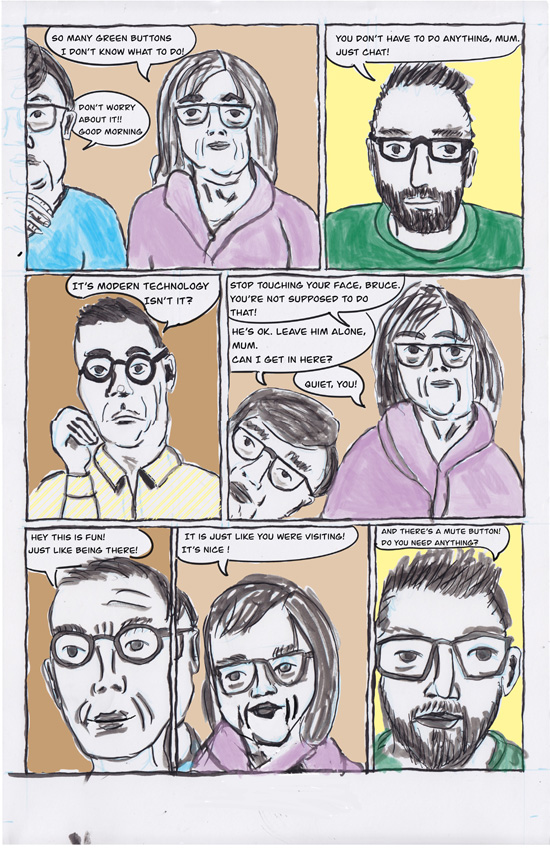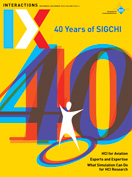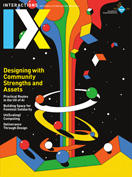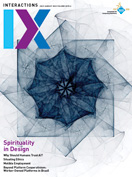Authors: Ernesto Priego, Peter Wilkins
Posted: Fri, June 12, 2020 - 10:40:33
In the period between March and May 2020, we have been working on simultaneous projects employing qualitative methods to create comics in response to the Covid-19 pandemic. We have been motivated and inspired by disability and feminist scholarship, taking on board evidence-based warnings about the dangers of well-meaning but counterproductive “empathy building” exercises in design and health interventions [1].
Interested in further developing the participatory narrative research affordances of comics, we have rehearsed with autoethnographic methods, reflecting on our own experience during the pandemic. We have operated from the positioning that “the primary ethical standard against which any autoethnography should be evaluated is ‘an ethic of accountability'” [2]. This piece hopes to contribute to meeting that principle.
In its “Mental health and psychosocial considerations during the Covid-19 outbreak,” the World Health Organization (WHO) advised to “keep in regular contact with loved ones (e.g., via telephone, email, social media or video conference)” [3]. Similar advice regarding contact via videoconference has been issued by several international charities, including HelpAge International.
The emotional aspect of comics and comics reading goes beyond the remit of this contribution, but it has been an empirical consideration for us. The WHO has also advised paying “attention to your own needs and feelings” and to “engage in healthy activities that you enjoy and find relaxing” [3]. The autoethnographic work of making a comic served this purpose too, allowing for the integration of an enjoyable activity (drawing, making comics, sharing them with family and friends) during times that have been indeed stressful for all of us.
It is in this critical context that we brainstormed ways of responding creatively to the Covid-19 pandemic. The common experience of caring for and staying in touch with our own relatives remotely prompted the co-design of the one-page comic shown in Figure 1.

Figure 1. Art by Peter Wilkins; Editing by Ernesto Priego (2020) CC-BY. [4]
Visualizing the family videoconference
The comic depicts two middle-aged brothers having a FaceTime call with their parents during the lockdown in Vancouver, Canada. One of those brothers is also one of the authors: Peter. His family members gave their express consent to be drawn (and, in one instance, named by first name) in a comic representing a family videoconference call that would feature Peter himself too. As autoethnographic work, the comic is the result of principles of artistic and narrative practice; for example, the representation and naming of living persons follow accepted practice in autobiographical comics [5].
The comic highlights an initial discomfort with the technology that gives way to accommodation and enjoyment. The parents are shown having some trouble engaging with the technology, but eventually they get to grips with it and enjoy the meeting with their sons, though the tech keeps reasserting itself. We think the comic can help, through humor, to visualize the idea that videoconferencing platforms can serve effectively as substitutes for physical presence—if not perfectly, at least closely enough to afford satisfaction to all participants.
The characters’ foibles assert themselves as they would in physically present encounters, while the technology affords new venues for these foibles: the mother’s anxiety over the buttons, the father’s attempts to get in the picture. Certain repetitions in the conversation (“stop touching your face”) and actions on screen (dad trying to get in the camera view) led to the choice of images and text.
The comic was created through a combination of manual and digital methods, employing traditional analog drawing tools and ProCreate. It was initially reviewed in rough sketch form, then in color, then in a semifinal version. Three iterations followed after formative and summative feedback from the participants represented, and a final version was agreed on by all parties.
It is tempting to flout stay-at-home guidelines to visit parents, but we know that the risks to people over 70 is significant. The comic aims to encourage the use of videoconferencing software to connect with aging parents and relatives, rather than take the risk of physically visiting them during the Covid-19 crisis.
As of April 14, 2020, fatality rates for those over 80 years of age was five times the global average. On May 1, 2020, the United Nations released the Secretary-General’s Policy Brief: “The Impact of Covid-19 on Older Persons.” It stated that “each of us—states, businesses, international organizations, companies, communities, friends and family—need to step up our effort to support older persons. We must do everything possible to preserve their rights and dignity at all times” [6]. At the time of writing this, the Covid-19 outbreak keeps having a devastating impact on the lives of older persons. It is everyone’s responsibility to contribute to their well-being with the means we have at our disposal, however humble they may be.
Limitations
The comic is idiosyncratic and subjective; it represents the interactions of one specific family. No formal data gathering or analysis went into creating the image beyond first-person observations of a single family by one of its members during a series of family calls. As a visual medium, comics present significant accessibility challenges for those with reading and/or visual disabilities or neurodiversity. Accessibility is an essential requirement for us in design work and it would be possible, if circumstances allow, to produce a detailed descriptive alt-text and/or a version of the comic in a PDF with machine-readable text so it could be read aloud.
Acknowledgments
Both authors contributed equally to this article. With many thanks to colleagues at the Centre for Human-Computer Interaction Design, City, University of London, and at Douglas College, Canada; to Simon Grennan, Francisco de la Mora, and to all the Wilkins and Priego-Morris extended families. For more on the authors’ previous work using comics, please visit https://blogs.city.ac.uk/parablesofcare/
Endnotes
1. Bennett, C.L. and Rosner, D.K. The promise of empathy: Design, disability, and knowing the “other.” Proc. of the 2019 CHI Conference on Human Factors in Computing Systems. ACM, New York, 2019, Paper 298, 1–13; https://doi.org/10.1145/3290605.3300528
2. Medford, K. Caught with a fake ID: Ethical questions about slippage in autoethnography. Qualitative Inquiry 12 (2006), 853–864; https://doi.org/10.1177/1077800406288618
3. World Health Organization. Mental health and psychosocial considerations during the COVID-19 outbreak. Mar. 18, 2020; https://www.who.int/docs/default-source/coronaviruse/mental-health-considerations.pdf?sfvrsn=6d3578af_2
4. Wilkins, P. and Priego, E. A Comic Visualising the Experience of Video-conferencing with Aging Parents During the COVID-19 Pandemic. 2020; https://doi.org/10.25383/city.12348959.v1
5. El Refaie, E. Visual modality versus authenticity: The example of autobiographical comics. Visual Studies 25, 2 (2010), 162–174, DOI: 10.1080/1472586X.2010.502674
6. United Nations. Secretary-General’s Policy Brief: The impact of COVID-19 on older persons. May 1, 2020; https://www.un.org/development/desa/ageing/news/2020/05/covid-19-older-persons/
Posted in: Covid-19 on Fri, June 12, 2020 - 10:40:33
Ernesto Priego
View All Ernesto Priego's Posts
Peter Wilkins
View All Peter Wilkins's Posts





Post Comment
No Comments Found